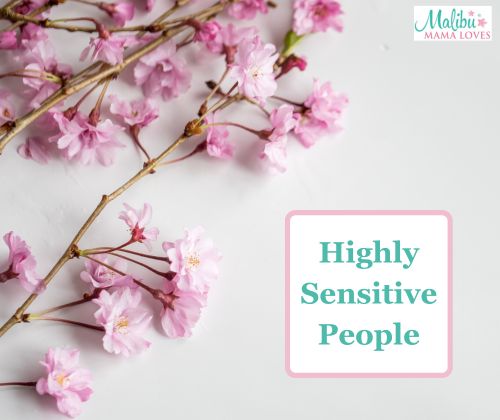Highly Sensitive People
In the mid 90’s, psychologist Elaine Aron introduced the concept of Highly Sensitive People as a personality trait. Since then it has gained traction and offered an understanding for people that had never before been talked about. Many feared being teased and told “stop being so sensitive” and “you’re overthinking” as it is common to hear people say these hurtful things. I grew up being told this.
Today, in 2023, nearly 20% of our population identify as Highly Sensitive People and it’s time we understand it!
So what does this mean? And if you feel like you may be one, what can you do? Keep reading to find out!
What Are Highly Sensitive People?
Dr. Aron’s description of Highly Sensitive People (HSPs) is simply someone with a deep sensitivity to the physical, emotional or social situations and information around them. They feel deeper and more intensely than others. They are often a neurodivergent person who is thought to have an increased or deeper central nervous system sensitivity to physical, emotional or social stimuli.
HSPs are usually disturbed more by violence, tension, confrontation or feelings of being overwhelmed – whether by the fabrics they are wearing or the type of environment they are in or having too much to do vs. not enough to do. They hurt more, sometimes over things that have nothing to do with them like the news. They cry longer. They laugh harder. They feel things so deeply that sometimes they just shut down.
On the positive side, Highly Sensitive People have been shown to have higher levels of creativity, richer personal relationships and a greater appreciation for beauty – they seem to find it everywhere. Their relationships are deeper and very physically stimulating. HSPs commonly form deep bonds with people and share big dreams together. They are fascinated by other people and often feel what they are feeling. They are usually incredibly creative entrepreneurial thinkers.
It is confirmed that the highly sensitive trait exists in over a 100 other species of animals and is suggested as an evolutionary trait that increases the chances of survival.
But there are some challenges too…
Challenges for Highly Sensitive People
Like all personality traits, highly sensitive people face many challenges. They will struggle to adapt to new circumstances. Change is extremely hard for them. Occasionally they may show some inappropriate emotional responses in social situations – like laughing (because of discomfort) during an argument. They easily can become uncomfortable in response to bright lights, sounds, fabrics or other physical sensations. They get overwhelmed easily and need to have time in quiet, dark spaces to recharge.
If any of this resonates with you, click here to take Dr. Aron’s test to determine if you carry any highly sensitive traits. It is quick and easy and interesting! Though it is not an official diagnosis, it is always good to learn things about yourself.
What Makes A Person Highly Sensitive & How Can You Cope?
People have been studying this concept for over 20 years now. Research shows us that a variety of factors contribute to a person being highly sensitive. They are evolution, environmental, genetics and early childhood experiences.
It is noted that if you have experienced some form of childhood trauma, than you are more likely to be highly sensitive as an adult. Trauma creates changes in our brains and bodies that will last forever.
So how do you cope with as Highly Sensitive People?
There are a few steps you can take to protect yourself and set yourself up for as much success as possible. They are:
- Create positivity. Add time to your schedule for gratitude and appreciation, plan something that makes you smile and you can appreciate the ability to do it. This will help insulate you against any additional stressors you may encounter through the days and gives you something to look forward to.
- Avoid triggers and stressors. Identify what upsets you and do your best to avoid them.
- Learn to say no. This is a hard one for me!! But oh so important. Learn your boundaries and get comfortable saying no to things when you become overwhelmed. I promise it is ok to do!
- Set up a safe space. Wherever it may be – out in the garden, down in the basement, in your bedroom, your closet, wherever! But create a soft space that brings you comfort that you can go to when you are feeling overwhelmed.
- Journal. This has been proven to help us process our emotions and bring us comfort and relaxation. I can’t recommend it enough. Click here for some of my favorite journal prompts for trauma. For highly sensitive people, journaling is essential to peace of mind.
Malibu Mama Loves Xx



 Hi There! Let's Share ✩ Explore ✩ Awaken together! I’m a Mama, published author, biohacker, and trauma-informed life coach raising conscious kids who truly appreciate our world through travel. Welcome to the Malibu Mama Loves Conscious Living Lifestyle!
Hi There! Let's Share ✩ Explore ✩ Awaken together! I’m a Mama, published author, biohacker, and trauma-informed life coach raising conscious kids who truly appreciate our world through travel. Welcome to the Malibu Mama Loves Conscious Living Lifestyle!




 Ready To Turn Your Trauma Pain Into Purpose? Join Our FREE Masterclass Click
Ready To Turn Your Trauma Pain Into Purpose? Join Our FREE Masterclass Click 


